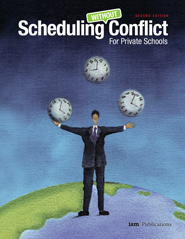

Now more than ever, your school must maximize its use of available time, space, faculty, and dollars. That’s what a great schedule does! It is also essential that you create a schedule design that complements your school’s mission and program, and addresses the needs of students and parents.
Scheduling Without Conflict for Private Schools defines the critical components of a strong schedule. Learn how to address common obstacles schedulers face, including ways to handle exam scheduling, advisory programs, schedule review, service learning, and limited space. Here you will find the key elements for designing a schedule that meets your school’s specific needs.
Learn how to:
- Orchestrate a strategic schedule review
- Recognize the symptoms of a toxic schedule—and how to remedy it
- Find teaching time to the best benefit to students
- Determine space needs and maximize your schedule accordingly
- Handle the implications of Advanced Placement (AP)
- Build outside experiences into your school’s schedule
- Balance scheduling and faculty culture
- The 21st Century School: Strategic Schedule Review
- The Benefits of Schedule Design Change
- Getting Started on Scheduling: Put Your Parameters in Place
- Faculty Motivation, Schedule Change, and School Change
- The Symptoms of a Toxic Schedule—and the Remedy
- How to Recognize a Capable Scheduler
- The Scheduler's Power: What's Good for Your Students?
- The Fluid Block Schedule
- Match Points Ease Scheduling Challenges
- Use Vertical Time to Expand Students' Learning Experiences
- Scheduling and Length of Period
- Scheduling Theory: The Rate of Collapse and 'Loose' Periods
- How to Find Academic Time and Reduce Stress
- The 21st Century School: Teaching Time
- The 21st Century School: The School Calendar
- The 21st Century School: Exam Periods
- Overcome the Myths in Exam Scheduling
- Exam Schedules: Two Practical Scenarios
- Scheduling Supports Advisory Program Success
- Scheduling the 21st Century Service Learning Program
- Build a Schedule That Serves Lower Schoolers
- The Annual Strategic Scheduling Meeting
- Create a Middle School Program That Works!
- Scheduling and the Harried Teen
- Adolescent Sleep and Upper School Start Times
- Scheduling the Upper School Annual Calendar
- The Rhetoric of Rigor II: Stress, Schedules, and Fun
- Eliminate Sequencing in Visual Arts to Promote Individualized Learning
- The Implications of Advanced Placement for Scheduling
- Recess May be More Important Than You Think
- Scheduling and Faculty Culture
- Keep Evolving Program Needs on Your Facilities ‘Radar’
- Facilities Management for the Year-Round School
- Faculty, Space, Ownership, and the Schedule


